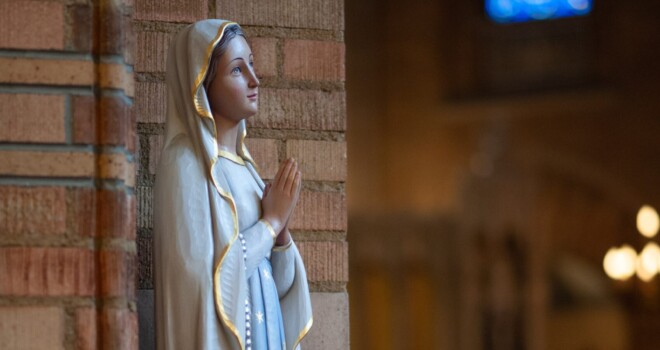Since we were moving to a much smaller domicile, it was necessary to go through our personal belongings and reluctantly say good bye to many items we held dear. Necessity is uncompromising. It pained me to discard so many letters from so many friends who, over the years, warmed my heart with their kind sentiments. But many of these sentiments, I must confess, were extravagant. How could I prevent them from going to my head?
I attributed them, by and large, to the generosity of my friends. Therefore, I could not take their extravagant praise at face value. Secondly, if there were any truth to what they wrote, I redirected their praise to God. After all, He is the ultimate source of all that is good.
My thoughts naturally turned to Mary, Mother of God. One might say, on the basis of worldly standards, that she had every reason to be proud. She was the mother of God. That’s better than winning an Academy Award! Moreover, she was singularly blessed with an Immaculate Conception. That is far better that throwing a game-winning, seventy yard touchdown on the last play of the game!
Yet, Mary is, above all, a model of humility! In her Magnificat, she declares, “My soul glorifies them Lord . . . For He has looked with kindness on his lowly servant.” She is, despite her unique status and singular gifts, “lowly.” She is the servant of the Lord. He gets all the credit. She responds not with pride, but with humility. Her freedom is to say, “Yes.”
In his proclamation of the Immaculate Conception in 1854, Pope Pius IX stated: “The Blessed Virgin Mary, at the first instant of conception, by a singular privilege and grace of the omnipotent God, in consideration of the merits of Jesus Christ, the Savior of mankind, was preserved free from all stain of original sin.” We may draw special attention to the words, “in consideration of the merits of Jesus Christ, the Savior of mankind.” Mary, along with everyone else, needed to be saved. She owed everything to God and fully acknowledged that fact in her Magnificat.
C.S. Lewis has given us a precise and profound definition of humility. “Humility is not thinking less of yourself”, he writes, “but thinking of yourself less.” Mary surely did not think less of herself, as indicated in her Magnificat. She fully accepted being the Mother of God. On the other hand, she did not boast about it. She accepted her role with utter humility.
Mary’s lesson to us is clear. Since all our gifts, including our very existence, comes from God, we should be humbly grateful. Pride, therefore, is a way of denying God credit for his generosity. In this sense, it is a form of blasphemy. Humility gives us the freedom to be alive in truth. It is a terrible burden to go through life desperately trying to uphold a lie. Mary is not only a model of humility, but a model of realism.
The late Paul Mankowski, S.J., has wisely averred that “All orthodox devotion to Mary rejoices in her triumph because she was conscious of that profound humility of which we have ourselves only the faintest inkling.”
Photo by Josh Applegate on Unsplash












